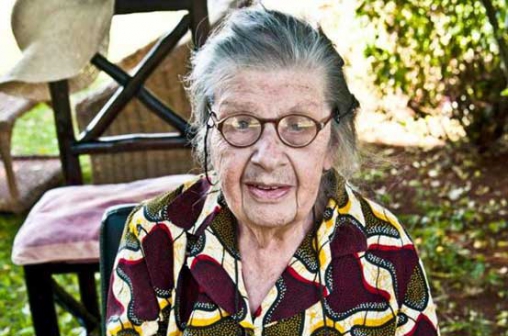
Marjorie Oludhe Macgoye, the iconic writer who through the years became difficult to separate from her literary nature took a bow from the land of the living at her home in Ngara on Tuesday afternoon. Now that light has gone out of her physical world, all that remains is the torch of a literary icon that was focused – feminist maybe – as some writers and critics have noted. Marjorie was aged 87.
Her work was widely read at ones convenience but more studied in English and literature lessons; if it was not Coming to Birth, then it was A Freedom Song, or Song of the Unborn Dead – Song of Nyarloka. Literary scholars describe her as a lady who easily oozed Kenyan culture than most Kenyans would, albeit through the pen.
But who was Marjorie?
Dr Jennifer Muchiri, a writer and lecturer at the University of Nairobi’s Literature department, says Marjorie had a unique way of ensuring her work conformed to the African culture. Marjorie was not born in the Kenyan culture, but when she got married to D.G.W Macgoye, a medical doctor, she weaved easily into his culture and embraced it as her own.
“Look at her work like the Freedom Song or Coming to Birth; she has roped in the Luo culture and by extension the African culture so effortlessly and both just like the other works she did still remain relevant to this day, speaking to issues that Kenya is grappling more 50 years after independence,” says Muchiri.
Muchiri adds that whatever issues Marjorie tackled are still here with us. “Street families, abortions, the place of the girl child and poverty that continues to bite a majority of the population here are yet to be solved. The myths surrounding HIV and Aids are still not done away with and this was tackled by Marjorie in her book Chira,” says Muchiri.
CONFORMIST
Marjorie’s work cannot be gainsaid according to Dr Rose Opondo who teaches literature in English at Moi University. She also concurs with Muchiri that the prolific writer found her way by understanding the culture in which she was writing.
Opondo argues that Marjorie tried and pulled off writing like a ‘real’ Luo who understood the culture well. This, she says is a challenge to many Kenyan writers who are trying hard to fit European culture in their writing style.
“Her immersion into the culture she was writing about was exemplary and made her work acceptable to many people. It is no wonder then that her works were studied in the school system; read her book Coming to Birth and you realise she really took time to understand the culture,” says Opondo.
While some critics would like to lump Marjorie with feminists, Opondo cautions that the writer just had a way of creating strong characters out of women to tackle gender issues and imbalance. The simplicity with which she handled grave issues without necessarily being a street activist also endeared her to many literary lovers.
She says, “Marjorie wrote about women, not from a feminist perspective but from a human shunning societal ills that have bedevilled women over the ages.”
The other aspect of Marjorie according to Opondo was that she never imposed her biases on the reader but left the decision to the audience following 19th-century Norwegian playwright, theatre director, and poet Henrik Ibsen’s advice that a writer must never immerse their opinion on the reader, but give freedom to decide which side to take.
Freedom Song which speaks about Atieno, the village girl who comes to the city to work as house help for relative is a common phenomenon among poor families whose children who have completed primary education are turned into domestic helps. Atieno lives a rather short life as her image painted by Marjorie lets the reader flow through the text with ease.
Opondo says, “Freedom Song is one poem that many learners have interacted with especially during secondary school.”
The other works that Marjorie did include Homing In, Growing up at Lina School, The Black Hand Gang, Street Life, A Farm Called Kishinev, and Creative Writing in Prose. Her poem Song of the Unborn Dead lends a voice to the thousands of children whose lives are snuffed out before they get to see light of day. For her work Coming to Birth, Marjorie was awarded the Sinclair Prize for fiction in 1986.
FAMILY
From a family front, Marjorie is described as non-elitist from the way her family blended well with the local populace of Kambare Village of Gem, Siaya County.
Kenneth Ogosia, immediate former Director of Communications at the Siaya County Tourism Department, says Marjorie was a people person whose gate was never closed to neighbours and this did not isolate the family from others. In fact, one of her three children George Macgoye studied at Usenge High School in Bondo.
Ogosia says, “Marjorie worked together with Grace Ogot to raise the profile of the girl child in Siaya County. They also, in a bid to improve language skills, subscribed newspapers for some schools in the county.”
He adds that funerals in the region are a part of the cultural practices that bring people together and she was always part of them – George takes after her in this – and this goes to show how race did not alienate her from the Kenyan culture.
 The Standard Group Plc is a multi-media organization with investments in media platforms spanning newspaper print
operations, television, radio broadcasting, digital and online services. The Standard Group is recognized as a
leading multi-media house in Kenya with a key influence in matters of national and international interest.
The Standard Group Plc is a multi-media organization with investments in media platforms spanning newspaper print
operations, television, radio broadcasting, digital and online services. The Standard Group is recognized as a
leading multi-media house in Kenya with a key influence in matters of national and international interest.

